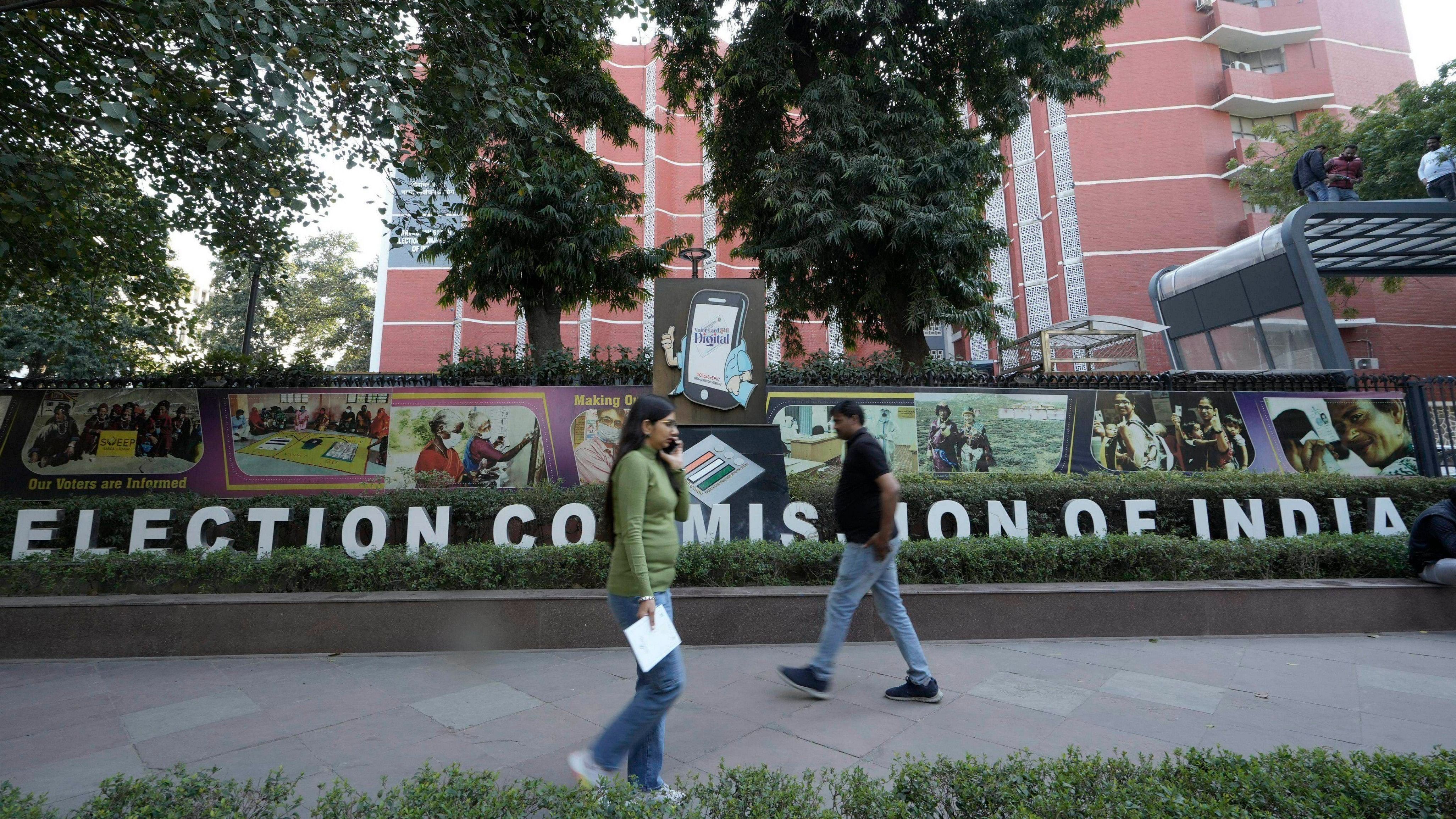
People walk past the Election Commission of India premises, in New Delhi.
Credit: PTI Photo
The resignation of Election Commissioner (EC) Arun Goel coupled with the earlier superannuation of EC Anup Chandra Pandey on February 14, having increased the vacancies in the Election Commission of India (ECI) to two, has raised some discussion on how these vacancies will be filled. Although constitutionally there is no urgency to fill these vacancies as the Chief Election Commissioner (CEC) alone supervising the conduct of the impending Lok Sabha elections is well within constitutional provisions.
However, given the discourse about the role and performance of the ECI in the last few years, filling these vacancies is a matter of public interest.
The existing law for the appointment of the CEC and ECs is ‘The Chief Election Commissioner and other Election Commissioners (Appointment, Conditions of Service and Term of Office) Act, 2023’, and under normal circumstances, this law should be followed. But, the circumstances are not quite normal because the enactment of this law has a recent history.
An important event in this history is a Supreme Court (SC) judgment on March 2, 2023, in the Anoop Baranwal vs Union of India case. Before this judgment, appointments of the CEC and ECs were done by the government of the day. This was because although Article 324(2) had asked Parliament to make a law on the process of the appointment, this law was not made till after the Anoop Baranwal judgment.
The operative part of the March 2023 judgment which it terms as ‘The final relief’ is as follows:
“We declare that as far as appointment to the posts of Chief Election Commissioner and the Election Commissioners are concerned, the same shall be done by the President of India on the basis of the advice tendered by a Committee consisting of the Prime Minister of India, the Leader of the Opposition in the Lok Sabha and, in case, there is no such Leader, the Leader of the largest Party in the Opposition in the Lok Sabha having the largest numerical strength, and the Chief Justice of India. This norm will continue to hold good till a law is made by the Parliament.”
This ‘final relief’ consists of 103 words, but the entire judgment is 378 pages! These pages explain the reasons for arriving at the ‘final relief’. A few selected examples of the reasons are given below:
“These observations have a direct connection with the question with which we are concerned, namely, the need to take the appointment of the members of the Election Commission out of the exclusive hands of the executive….”
“The Election Commissioners including the Chief Election Commissioner … must be chosen not by the executive exclusively…”.
A review of “the legislative history of Article 324, … unerringly point to one conclusion. The power of appointment of the Members of the Election Commission… was not to be lodged exclusively with the executive.”
“… we are concerned with the devastating effect of continuing to leave appointments in the sole hands of the executive … .”
It should be clear from the above excerpts that the overriding reason for the ‘final relief’ was that the appointment of the CEC and the ECs should not be left exclusively in the hands of the Executive.
Following the March 2023 decision, a Bill for the appointment of the CEC and the ECs was passed by Parliament in December. This law laid down that the appointment of the CEC and the ECs will be done by the President of India on the recommendation by a committee consisting of the Prime Minister, the Leader of the Opposition in the Lok Sabha, and a Union Cabinet Minister nominated by the Prime Minister. As is obvious, this committee gives a clear majority to the Executive because the Leader of the Opposition can always be overruled by the majority (2:1) consisting of the Prime Minister and the Union Cabinet Minister.
So, while the new law satisfies the ‘final relief’, it goes completely against all the reasons for the ‘final relief’ explained in the 378 pages of the judgment.
This law has been challenged in the Supreme Court in a petition filed by the Association for Democratic Reforms (ADR) on January 5, with the plea that the law fully violated the spirit of the March 2023 judgment. The ADR had also filed an application that the law be stayed till the petition is decided by the court. The court refused to stay the judgment, but admitted the petition and posted it for hearing in April.
The ADR has now filed an application on March 11, requesting the Supreme Court that the two vacancies be filled using the process suggested in the court’s judgment of March 2023 on the logic that the new law is under challenge. The court will hear the please on March 15. One must wait and see whether the real spirit of the Supreme Court’s March 2023 judgment is upheld or violated.
Jagdeep S Chhokar is a founder-member of the Association for Democratic Reforms (ADR). X: @JagdeepChhokar.
(Disclaimer: The views expressed above are the author's own. They do not necessarily reflect the views of DH.)